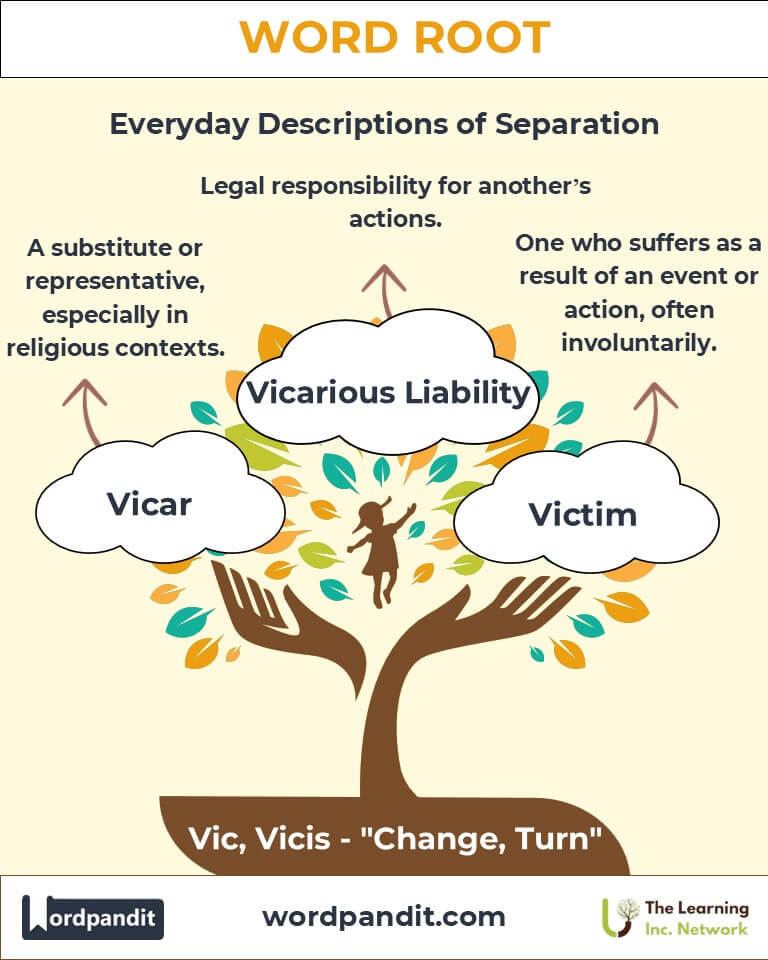Vic, Vicis: The Root of Change in Language and Life
Discover the transformative power of the word root "Vic" and its variants, "Vicis," originating from Latin and symbolizing change. From "vicarious" experiences to the "vicissitudes" of life, this root highlights the ever-shifting nature of existence and our ability to adapt and grow.

Table of Contents
- Introduction: The Essence of Vic and Vicis
- Etymology and Historical Journey
- Mnemonic: Unlocking the Power of Vic and Vicis
- Common Vic-Related Terms
- Vic Through Time
- Vic in Specialized Fields
- Illustrative Story: Vic in Action
- Cultural Significance of Vic
- The Vic Family Tree
- FAQs About the Vic Word Root
- Test Your Knowledge: Vic Word Root Quiz
- Conclusion: The Living Legacy of Vic
Introduction: The Essence of Vic and Vicis
Change is one of life’s constants, and the Latin root "Vic" (or "Vicis") embodies this reality. Pronounced "vik" or "vih-sis," it means "change," "substitute," or "turn." This root serves as the foundation for words that capture life's inherent dynamism, from the highs and lows of "vicissitudes" to the empathetic nature of "vicarious" experiences. Understanding this root offers insights into the adaptability and resilience that shape human experiences across disciplines and eras.

Etymology and Historical Journey
The root "Vic" traces its origins to the Latin word vicis, meaning "a change, turn, or alternation." In Roman times, it referred to the cycles and shifts inherent in life and governance. Over centuries, the root gave rise to terms reflecting substitution, transformation, and the inevitability of change. As Latin influenced other languages, words like "vicar" (a substitute in religious duties) and "vicissitude" (fluctuations in circumstances) entered English, retaining the core meaning of transitions and turns.
Mnemonic: Unlocking the Power of Vic and Vicis
To remember "Vic" and its connection to change, visualize a spinning wheel. Each turn represents a new phase, reminding us that life is full of vicissitudes and opportunities for transformation.
Mnemonic Device: “Vic—the wheel of change, turning life’s challenges into new opportunities.”
Common Vic-Related Terms
- Vicarious (vi-KAIR-ee-uhs): Experiencing something through another’s actions or feelings.
Example: “She felt vicarious excitement watching her son perform on stage.” - Vicissitude (vi-SIS-i-tood): A change or variation, often unexpected.
Example: “The vicissitudes of her career taught her the value of resilience.” - Vicar (VAI-kuhr): A representative or substitute, especially in religious contexts.
Example: “The vicar led the congregation in the bishop’s absence.” - Vice (vais): In place of or acting as a substitute.
Example: “The vice president assumed leadership during the CEO’s absence.” - Victim (VIK-tim): One who suffers as a result of an event or action, often involuntarily.
Example: “The victim sought justice for the harm inflicted.”
Vic Through Time
- Vicarious: Originally rooted in the Latin vicarius (substitute), this term evolved to describe emotional or experiential substitution, highlighting empathy and connection.
- Vicissitude: Derived from vicissitudo, meaning alternation or change, this word captured the unpredictability of medieval life, eventually becoming a staple in philosophical and literary contexts.
Vic in Specialized Fields
- Religion:
- Vicar: A substitute for a higher authority, reflecting spiritual stewardship.
- Application: Vicars manage parishes on behalf of bishops, emphasizing service and representation.
- Psychology:
- Vicarious Learning: Observing and learning from others’ actions.
- Application: Key in understanding social behaviors and developmental psychology.
- Law:
- Vicarious Liability: Legal responsibility for another’s actions.
- Application: Employers may be held liable for employees’ actions under this principle.
Illustrative Story: Vic in Action
Amid the bustling city of Verona, Sophia faced the vicissitudes of opening a bakery. After months of setbacks, including supplier issues and a fire, she persevered, inspired by the vicarious support of friends and mentors who shared her journey. Her ability to adapt to changes and find substitutes for lost resources exemplified the transformative power of Vic. Eventually, her bakery became a symbol of resilience, serving the community with warmth and freshly baked bread.
Cultural Significance of Vic
The concept of change, as captured by "Vic," resonates universally. In literature, themes of vicissitude explore human struggles and triumphs. Religious traditions value the role of vicars as spiritual substitutes, while modern psychology and law incorporate the root to describe critical concepts of learning and responsibility. "Vic" underscores humanity’s capacity to navigate and embrace change across cultures and disciplines.

The Vic Family Tree
- Mut (Latin: Change):
Examples: Mutation (a change in form or nature), Transmute (to transform into something new). - Vers (Latin: Turn):
Examples: Reverse (to turn backward), Diversify (to turn into varied forms). - Altern (Latin: Other):
Examples: Alternative (offering another choice), Alternation (a repeated cycle of change).

FAQs About " Vic " and " Vicis "
Q: What does the root "vic" or "vicis" mean?
A: The roots "vic" and "vicis" come from Latin, meaning "change" or "substitute." They appear in words related to alteration, replacement, or alternation, such as "vicissitude" (a change of circumstances) and "vicarious" (acting as a substitute).
Q: How does "vicarious" connect to "vic"?
A: "Vicarious" describes an experience or action performed by one person on behalf of another or felt indirectly. It connects to "vic" through the idea of substitution or taking someone else's place.
Q: What is "vicissitude"?
A: "Vicissitude" refers to a change or shift, often unexpected, in circumstances or conditions. It highlights the inherent variability of life and the alternation between different states.
Q: Why is "vicar" linked to substitution?
A: A "vicar" is a representative or substitute who performs duties on behalf of someone else, particularly in a religious context. The connection to "vic" lies in the idea of acting in place of another.
Q: What does "vice versa" literally mean?
A: "Vice versa" comes from Latin, meaning "with position turned." It is used to indicate that the reverse of a statement is also true, emphasizing alternation or interchange.
Test Your Knowledge: " Vic " and " Vicis " Mastery Quiz
1. What do "vic" and "vicis" mean?
2. Which word describes an experience felt indirectly?
3. What is a "vicissitude"?
4. What does "vice versa" imply?
5. Why is a "vicar" associated with substitution?
Conclusion: The Living Legacy of Vic
The root "Vic" and its variant "Vicis" remind us of life’s constant flux and the opportunities that arise from change. Whether in personal growth, societal roles, or linguistic expressions, "Vic" captures the essence of transformation. Embrace the vicissitudes of life, and let this root inspire adaptability and resilience in every turn.












